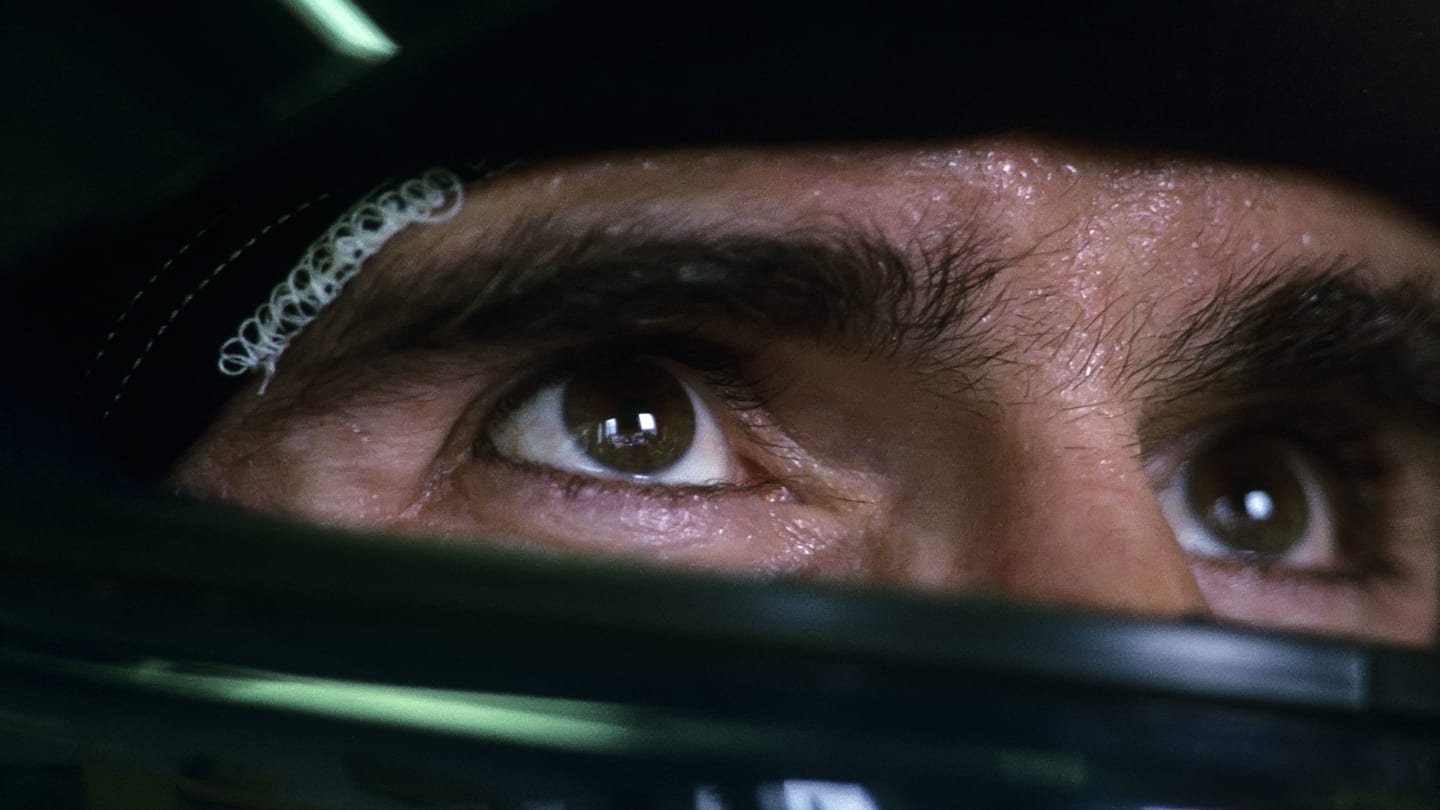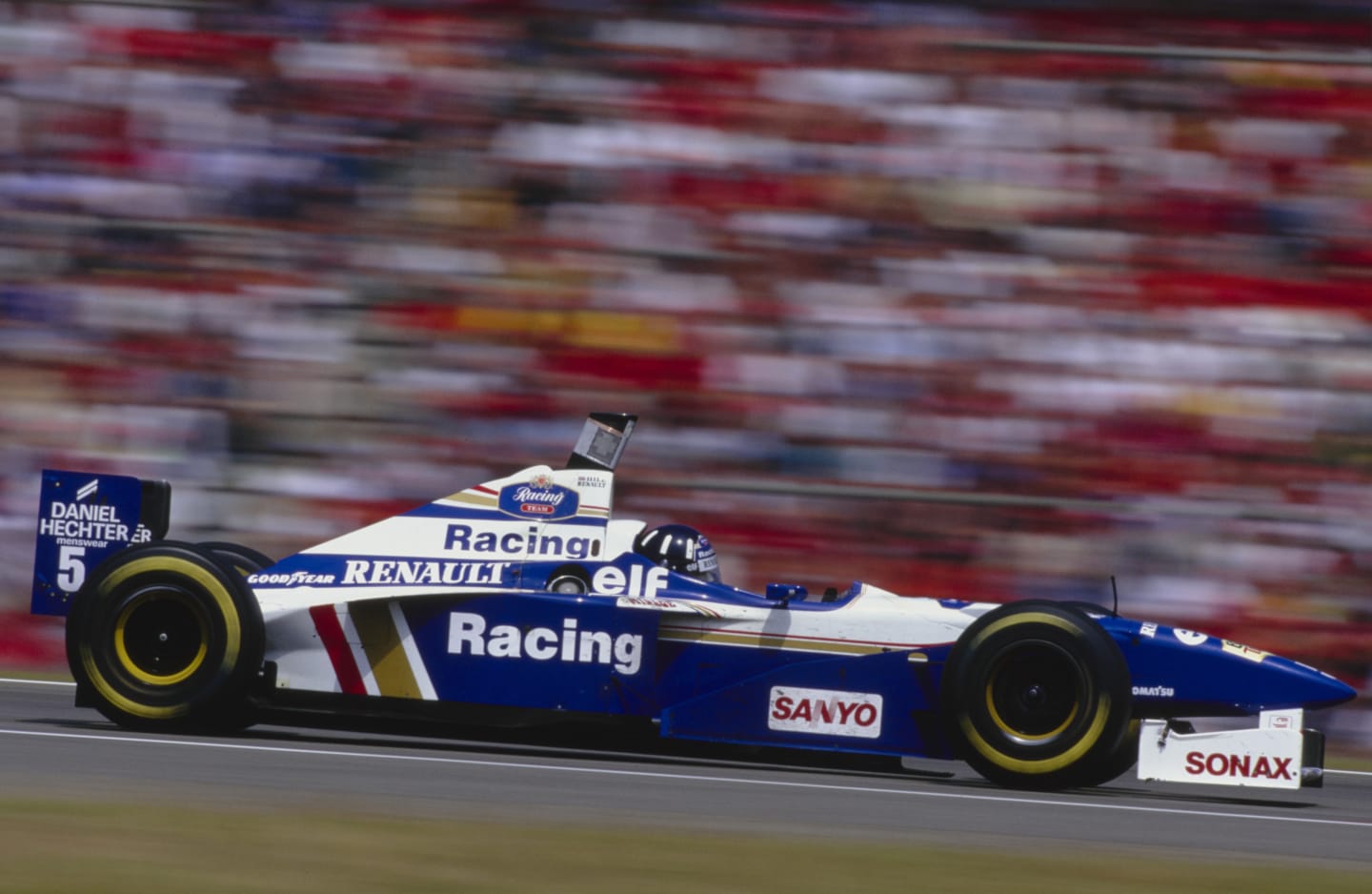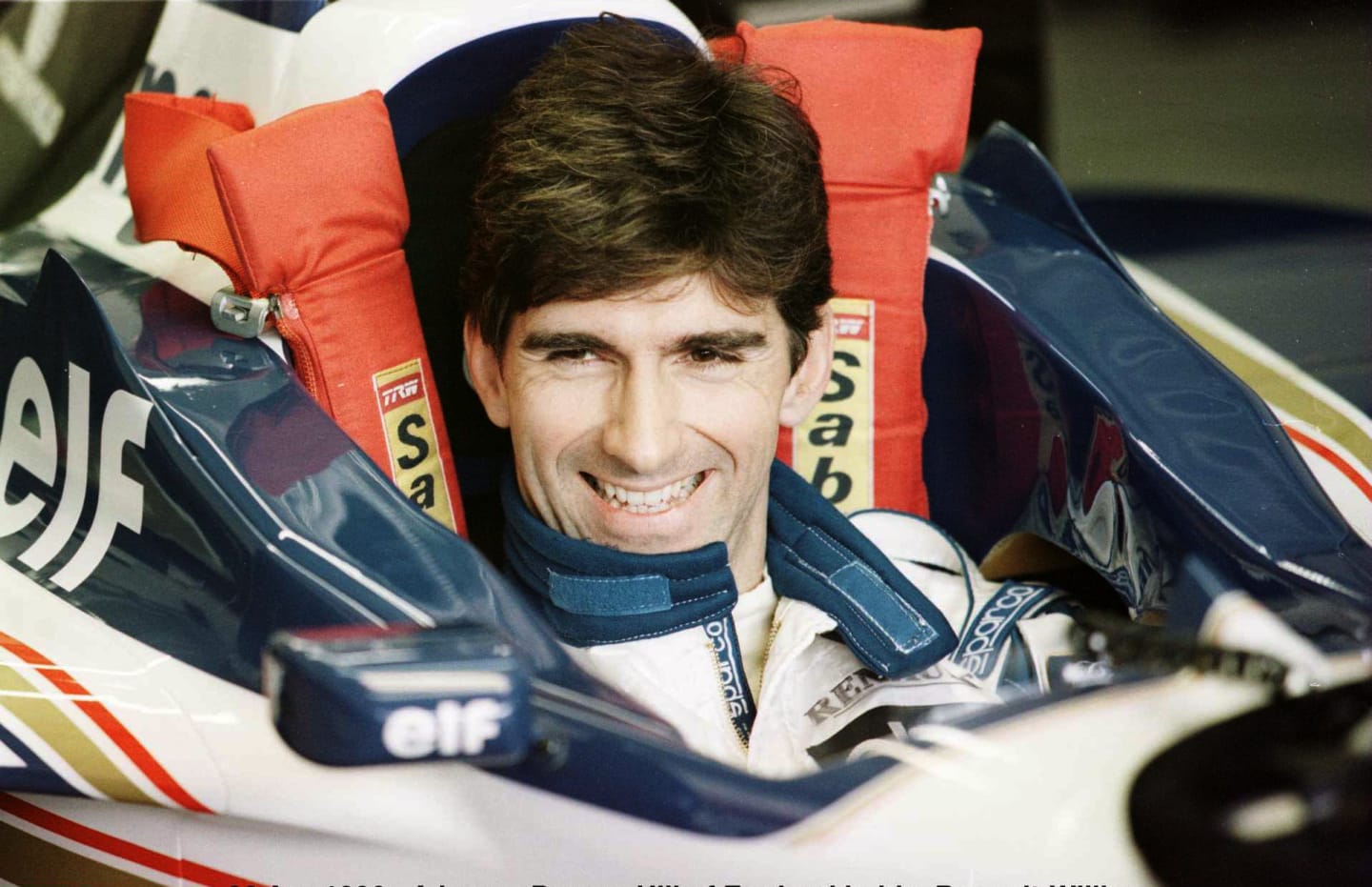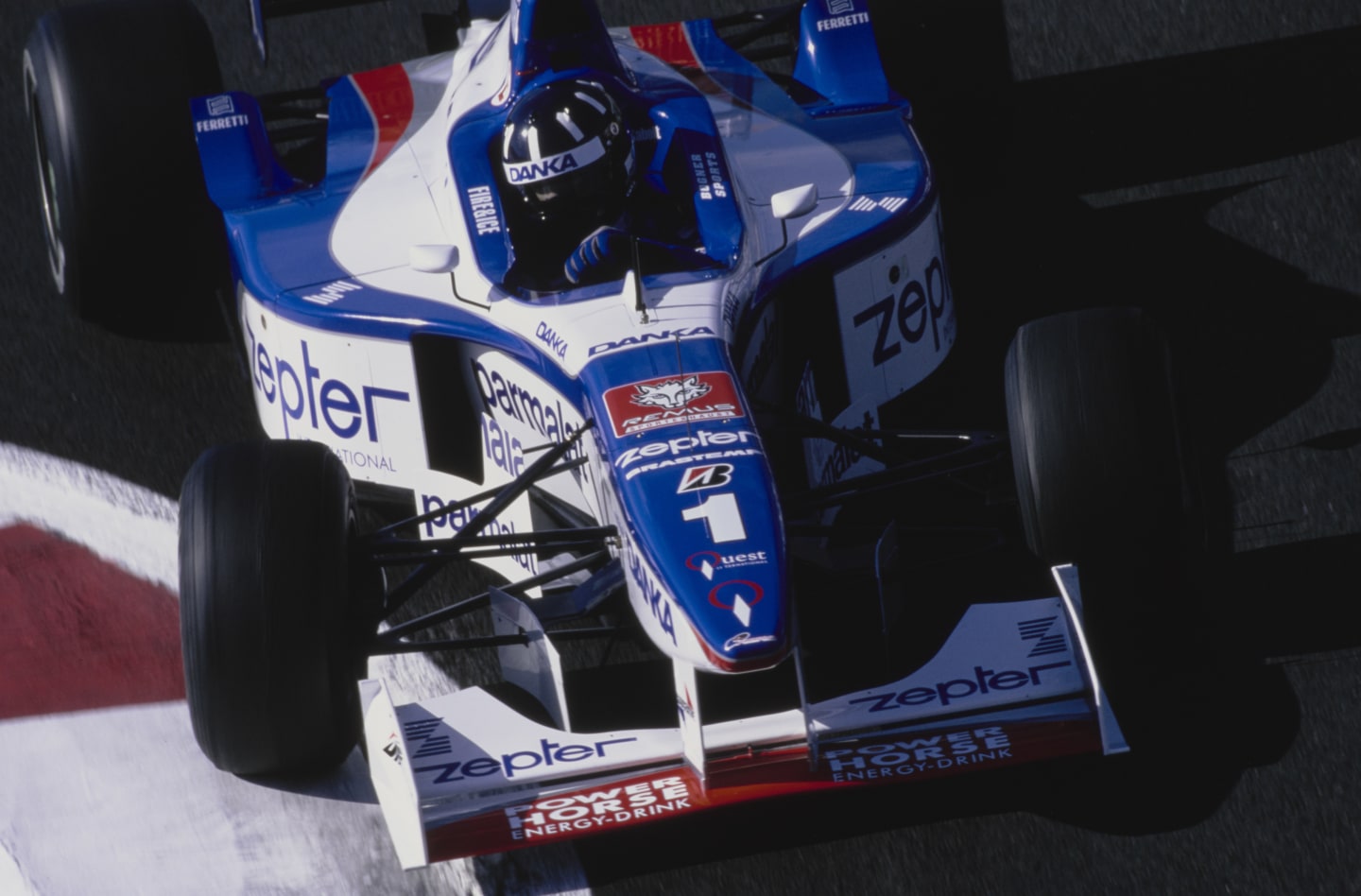
HALL OF FAME - 1996
Damon Hill

When Williams made Damon Hill a Formula 1 driver, despite his undistinguished racing record, Frank Williams said it was because he was "a tough bastard" and Patrick Head said he admired his "fierce inner determination." Like his World Champion father Graham Hill, he needed these qualities to achieve ultimate success in the sport to which - also like his father - he came late after a long struggle. His heritage helped, as did luck, but in the end it was his own ability that enabled Damon Hill to add lustre to the family name.
Damon Graham Devereux Hill was born on September 17, 1960, two years before his father Graham won his first driving title. The Hills lived comfortably in a large London house where from an early age Damon was accustomed to visits from such family friends as Stirling Moss, Jim Clark, John Surtees and Jackie Stewart. But he found their line of work boring to watch and was instead much more interested in motorbikes, a small example of which his father bought for him when he was 11. Four years later the Hill's happy home life was torn asunder when Graham and several members of his Formula One team were killed in an air crash. Insurance claims wiped out all the family savings, leaving Bette Hill to bring up Damon and his two sisters in drastically reduced financial circumstances.

Hill at the wheel of the Williams FW18 at the 1996 German Grand Prix
Damon credited both his parents for instilling in him the qualities he needed to endure and overcome the hardships that came his way. His father had become a champion through dedication, persistence and hard work and was also noted for his keen sense of humour. Both Graham and Bette Hill were highly competitive, single-minded people when they first met at the London Rowing Club (where she also rowed for England) and it was in their honour that Damon (like his father) chose to use the club's insignia on his helmet when he went racing.
To help finance his education (he studied English, history, economics and business administration) Damon worked as a labourer and as a motorcycle courier. In 1981 he started competing on bikes, preparing them himself and towing them to the races where he slept in a tent. In 1985, at the age of 25, he found enough sponsorship for a season of Formula Ford racing, where he showed promise but was not rated highly. The same was true of Formula Three, where he won three races in three years, following which another three years in Formula 3000 failed to produce a victory, though his obvious attributes as a hard-working, hard-tryer impressed Williams enough to hire him as a test driver, beginning in 1991. His Formula One debut the next year, with an impoverished Brabham team in a hopelessly uncompetitive car, proved to be a disaster when Damon only managed to qualify twice in eight races. Meanwhile, his continuing testing role with Williams (where he logged over 18,000 miles in two years) paid dividends: for Nigel Mansell, who won the 1992 driving title in a car Damon helped develop, then for Damon himself, who was promoted to replace him when Mansell left Formula One to race IndyCars in America.

Hill smiles from the cockpit of his Williams during practice for the 1996 European Grand Prix at the Nurburgring in Germany
In 1993, at the age of 33 and with only two Grand Prix starts on his CV, Damon made the most of the opportunity, winning three races and finishing third overall to his title-winning team mate Alain Prost, who then retired from Formula One racing. The next year, after Prost's replacement Ayrton Senna was killed in his third race with Williams, the task of leading the team fell to Damon, who responded brilliantly, helping rebuild morale and driving himself to exceed all expectations, save his own. His 1994 championship battle with Benetton's Michael Schumacher ended when they collided controversially in the final race at Adelaide. Schumacher, who was accused by some of deliberately taking his rival out, won the title by a single point from Hill, whom others thought could have avoided the crash.
In 1995, after he again finished second best to Schumacher, criticisms of Hill escalated. Some in the Williams team thought he should have done better in what was the best car and Schumacher suggested he was a second-rate driver. Many in the media were like-minded, though none could deny the dignity and decency of the man. His articulate way of speaking, laced with a dry humour (he played guitar in a punk rock band called Sex Hitler and the Hormones) and common sense wisdom, set him apart from mostly much younger peers (Schumacher was eight years younger), though his self-deprecating manner belied his steely resolve.

Hill drives the Arrows A18 during practice for the 1997 French Grand Prix at Magny-Cours
"Some people might think I got here because I had a sweet smile and a famous name," Hill said. "Well it wasn't like that. I was written off a lot during my career. The point I am making is that the fact I am at Williams is a measure of my determination to succeed. As for the team, it will naturally be more inclined to put its faith in someone who has actually done the job, rather than someone who claims he can do it."
And yet when he duly took the driving title in 1996, by winning eight of the 16 races and out-pointing his rookie team mate Jacques Villeneuve, the team lost faith in Damon Hill. Late in the season Williams told him his services were no longer required (and replaced him Heinz-Harald Frentzen). Though shocked by his unceremonious dismissal Damon maintained the decorum he thought a champion should have, leaving his indignant wife Georgie (they married in 1988 and had three children) to speak up for him. "Damon has proved himself to have more integrity and dignity in his little finger," Georgie Hill said, "than most people have got in their whole body."
With no top drives available he endured an unproductive 1997 at Arrows, then moved to Jordan, scoring that team's first Formula One victory in the 1998 Belgian Grand Prix. In his final season, with Jordan, his motivation waned noticeably and at the end of 1999 he finally hung up the well-known Hill helmet. There was no doubt he had done justice to the family name. To Graham Hill's total of 14 wins and two driving titles, Damon Hill added 22 victories and a World Championship.
Text - Gerald Donaldson